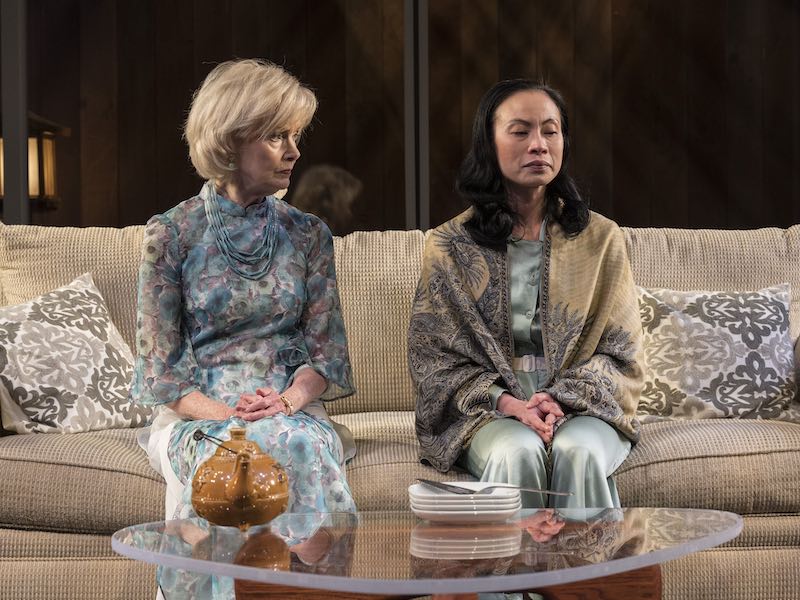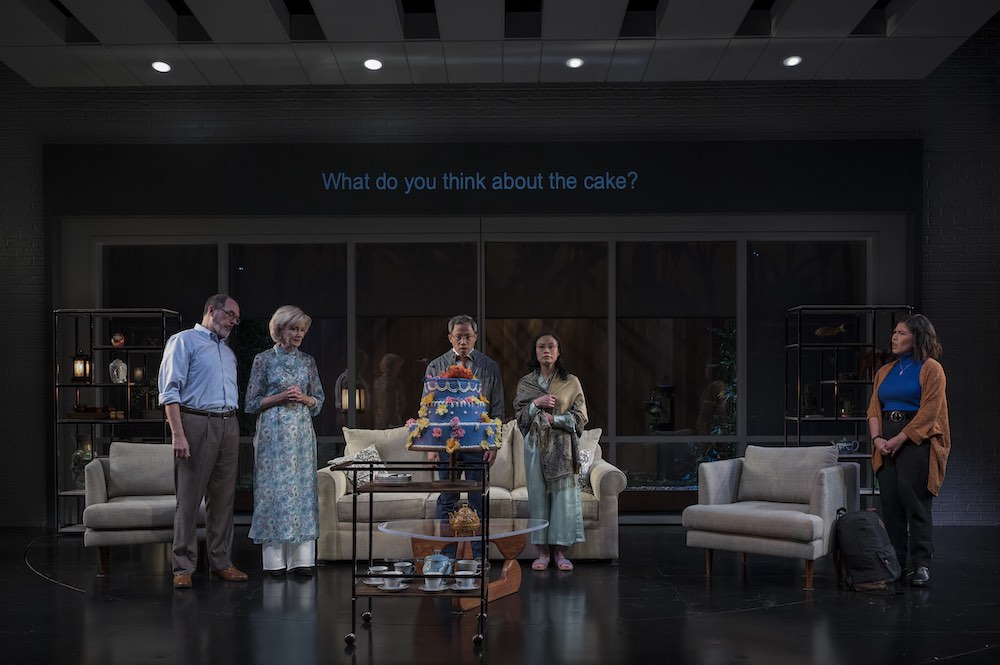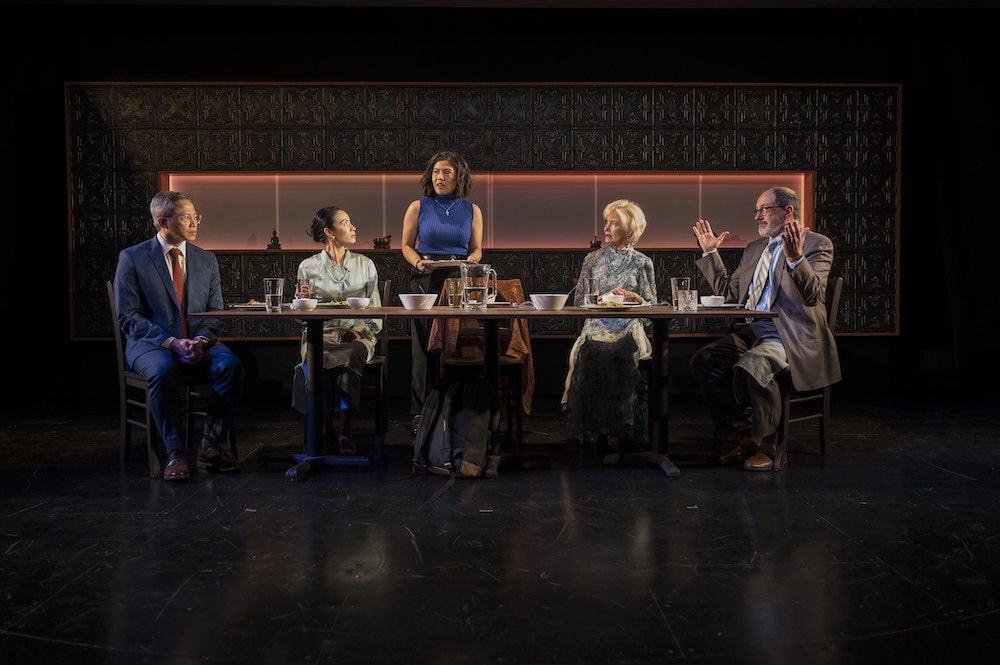The world premiere of DMV-based performer and playwright Tuyết Thị Phạm’s Dinner and Cake is a powerful play that sets up a familiar context—in-laws from different cultural backgrounds engaged in an awkward dinner together—with a quietly devastating denouement. Directed by Everyman Theatre’s associate artistic director Paige Hernandez, the family drama is a character study in miscommunication, the things best left unsaid, and feelings of wishing to belong. It’s also an understated satire that discusses colonialism, capitalism, cultural appropriation, white saviorism, and white feminism through stilted conversations.
Dinner and Cake is set in Washington, DC, in 2000, on the one-year anniversary of the marriage of Matthew and Thuy, who are absent due to a delayed flight. The Trầns have flown in from Vietnam for the celebration hosted by their inlaws, the Drummings. Mỹlinh, who has just moved to DC, agrees to act as the translator for the extended uncomfortable dinner. Coaxed by her white boyfriend that this favor may benefit her early career in law, Mỹlinh has no idea what’s to come when she joins the two couples for cake and tea at the Drummings’ home.

In the opening scenes, Mỹlinh, played with warmth, sarcastic asides, and occasional exasperation by Carolina Đỗ, meets Joyce and Murray Drummings at their home to await the arrival of the Trầns. While the Drummings lived in various Asian countries for over twenty years due to Murray’s diplomatic work, they demonstrate that cultural connection does not translate to understanding. For example, they lived in Vietnam for over three years and never learned to speak a word. This is why they rely on the Vietnamese American Mỹlinh to serve as their translator. The Drummings’ need to be well-liked by the Trầns borders on pathological.
Murray repeatedly invades Mỹlinh’s personal space while also fetishizing the beauty of Asian women; he’s a myopic clod who’s so culturally insensitive that he has never learned to pronounce his daughter-in-law’s name correctly, even as Mỹlinh patiently attempts to teach him. Bruce Randolph Nelson uses his tall stature to physically dominate his scenes with Đỗ.
Shockingly, Joyce is even worse than her husband, appropriating Asian clothing and religious rituals, then shedding white tears whenever she is questioned or confronted for her ignorance. Helen Hedman plays this part well, sometimes cooing and petting Mỹlinh as the well-intentioned white woman, but in a big blow-up in the third act, she releases the “Karen” and becomes a cruel and petty portrait of white ignorance and arrogance.

The evening starts off poorly with the Trầns, who are rightfully offended that they needed to take a taxi when the Drummings refused to drive to Dulles during rush hour. As Mr. Trần, Định James Đoàn is taciturn but observant, attuned not only to the emotions of his wife and Mỹlinh’s discomfort but also more cognizant of the Drummings’ boorish behavior than it first appears. And the local playwright Tuyết Thị Phạm does double duty playing Mrs. Trần—sardonic and frustrated in the first act, questioning in the second act, and heartbreaking in the third act when we learn more about how much she misses her daughter. (As we learn, the quick marriage between Matthew and Thuy may not be the romantic whirlwind it first appears to be.)
At the center of all this is Mỹlinh, who—like Phạm—moved to the United States at a very young age as her family sought asylum as refugees at the end of the Vietnam War. As translator, she covers topics as banal as the drive into DC (although humorously retold by Mrs. Trần) and as heated as the Vietnam War (of which Mỹlinh’s recently departed father had shared little). Fluent in both languages and cultures, Mỹlinh decides what to state directly, what to paraphrase, and what to exclude. In supertitles, the Vietnamese is translated into English, but very importantly we hear the Trầns and Mỹlinh speak in Vietnamese throughout the play.

During the course of the awkward meal at a Thai restaurant, Mỹlinh is treated like an Other by the Drummings, who ask her to serve them, and grilled by Mrs. Trần about her own marriage prospects and dating white men. Played deftly by Carolina Đỗ, who code-switches in her demeanor and gestures as well as languages, Mỹlinh begins to acknowledge her dual-cultural status and what is left behind, and to reflect upon her recent decision to move across the U.S., leaving her ill mother in her brother’s care, to be with her white boyfriend. In her playwright note, Phạm writes that “the constant mental negotiation to reconcile who I was with who I thought I needed to be had taken its toll… I make art to understand the difference between the two.”
In many ways, the play hearkens back to Guess Who’s Coming to Dinner. In that 1967 film, which grappled with the Civil Rights Movement and recent interracial court cases, such as Loving v. Virginia, the white Draytons are initially upset to meet their daughter’s Black fiancé. Over the course of the film, the two families come to an uneasy but hopeful agreement over their children’s upcoming nuptials, conceding that while the young lovers make each other happy, the couple was going to face discrimination and hatred from many others. (The evolution of the characters even shows the resistant white matriarch firing her longtime employee who makes racist remarks, something we know Mrs. Drumming would never do.)
In Dinner and Cake, there is not a happy conclusion: the play realistically delays any reconciliation, growth, or acceptance. It raises a series of questions that Phạm articulates in her director’s note, and it leaves the future between these characters unknown. We do not know how or if the Trầns and Drummings will repair their tense relationship. We do not know if Mỹlinh will reconsider her own recent familial, career, and relationship decisions. We never see Michael and Thuy together to see if their marriage may have longevity and happiness. Instead, the play’s concluding moments focus on the Trầns in a quiet embrace where they comfort each other.
Dinner and Cake is full of misunderstandings, difficult conversations, tense silences, and yes—moments of humor, too. Come for the awkward family dinner and stay for the world’s ugliest cake of white privilege.
Running Time: 90 minutes without an intermission.
Dinner and Cake plays through October 2, 2022, at Everyman Theatre, 315 West Fayette Street, Baltimore, MD. For tickets ($29–$69), call the box office at (410) 752.2208 or purchase them online. Box office hours are Monday to Friday from 9 am until 6 pm, and Saturdays from 10 am until 5 pm.
The program for Dinner and Cake is online here.
COVID Safety: Masks are encouraged but not required for attendance. Everyman’s Guide to Patron Health and Safety is here.




